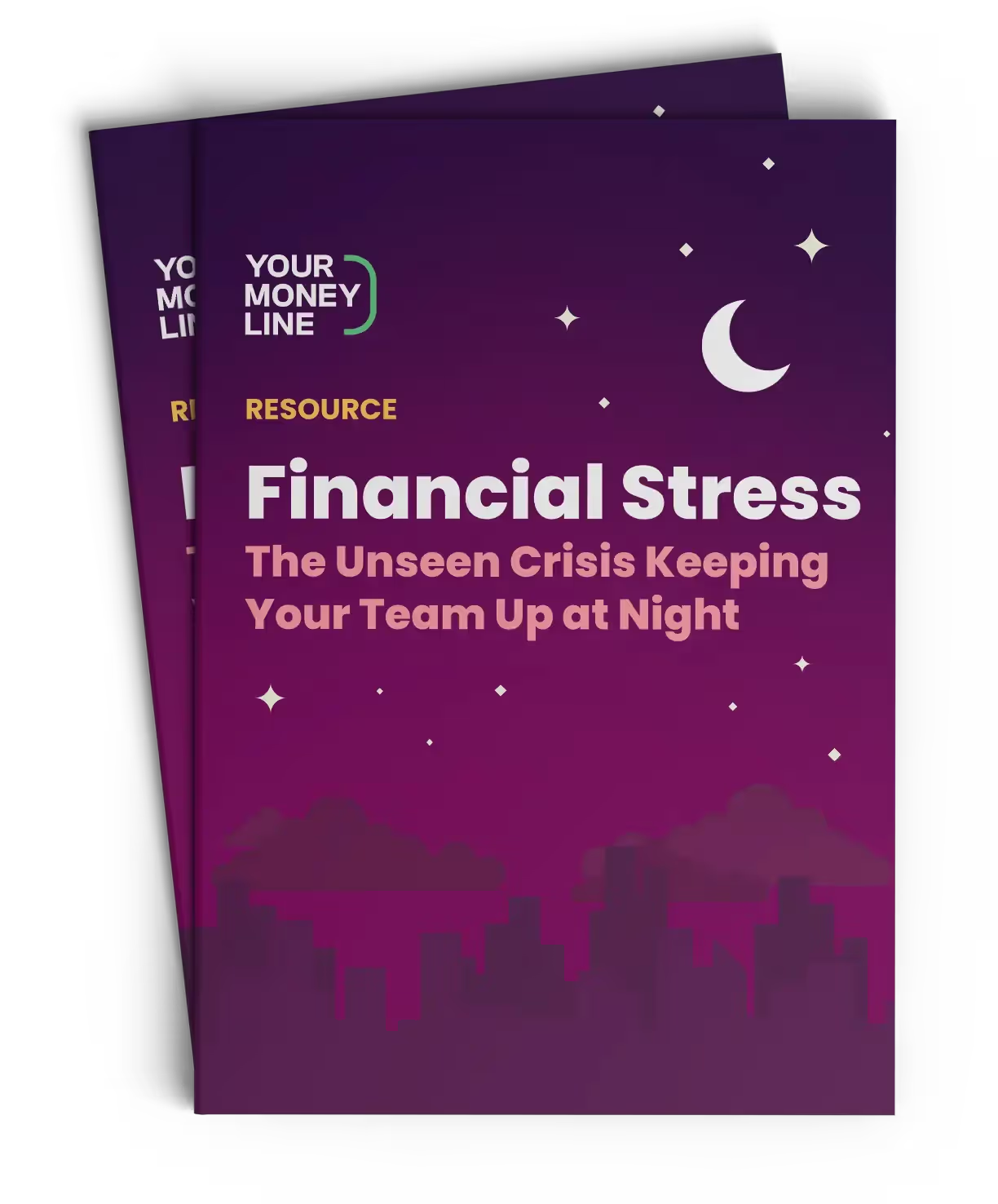Table of Contents:
Introduction
The impact of financial stress on employees
Generational manifestations of financial stress
The impact of financial stress in the workplace
Strategies for employers to support financially stressed employees
Conclusion
Where is your weakest link?
You’re only as strong as your weakest link. You know this saying, right?
Think about it—you can have the strongest and most durable chain made of solid steel, but if one link is corroded and worn out, the entire chain will snap under pressure.
It's the same with your team at work. Your company is only as strong as the combined efforts of your workforce. Each employee is an individual link, bringing their own unique skills and hustle to the table.
But when you've got that one team member who's distracted by money stress, they become the weakest link, creating a vulnerability that can break the chain.
And this "something" I'm talking about? Financial stress.
Money problems are like termites, slowly eating away at your employees from the inside out. Whether it's the fresh, out-of-college young professional dealing with soul-crushing student loans or employees nearing retirement age with too little in their 401k, financial worries mess with people's heads and bodies in a big way. In fact, 80% of US employees report feeling financially stressed, according to Harvard Business Review.
When your team is worried, beat down, and consumed by their financial challenges—that high-performing team you hired suddenly isn't performing so high anymore.
No role or pay grade is immune to the grip of money worries. When finances bog down your employees, their work suffers. And when their work suffers, your entire organization feels the hit eventually. All because of one corroded link throwing everything off.
So, let’s get into the nitty gritty of financial stress: how it impacts employees, how we see it affecting different generations, the impact on business, and strategies for employers to ensure they’re doing everything in their power to help strengthen their weakest link.
The impact of financial stress on your employees
Financial stress goes far beyond numbers in a bank account— it's a psychological battle draining your mental and emotional well-being. We're talking anxiety, depression, and lack of motivation— a total brain drain that makes it nearly impossible to function at your best.
We interviewed Nathan Astle, CFT-I™, who is a financial therapist and the founder of the Financial Therapy Clinical Institute. This interview was conducted for our Workplace Financial Wellness Advocate course, where we discussed the deep connection between our emotions and finances. You can watch the full interview here.
During the interview, Astle revealed that more than 90% of people he works with struggle with problems such as decreased focus, productivity issues, and intense shame tied to their financial situation. He further explained that a person's finances can significantly impact how they perceive themselves.
Astle emphasizes that money worries represent a full-blown assault on your psyche. Anxiety, panic, hopelessness—these become the new normal mindset.
Furthermore, the fear of financial ruin often leads to paralysis rather than proactive steps to improve the situation. The weight of money troubles is truly a heavy burden to bear.
Financial stress doesn't just impact you as an individual, either. It's contagious, infecting your personal life with trust issues, communication breakdowns, and growing distances between loved ones. The psychological wounds of this type of stress leave deep, lasting scars without a supportive space to process the fear, shame, and grief.
The mental toll of financial stress manifests in three key ways in the lives of employees:
1. Anxiety and depression
The constant worry over finances breeds overwhelming anxiety and depression. The emotional complexity around money frequently triggers panic attacks and a spiraling sense of hopelessness.
2. Decreased focus and productivity
Financial stresses consume immense mental bandwidth, impairing cognitive abilities and work performance. Managing debt, budgets, and looming bills makes it exceedingly difficult to remain focused.
3. Strained relationships
Money is deeply personal and emotional. It's intertwined with our values, self-worth, and closest relationships. Money problems foster anxiety, frustration, and shame—catalysts for increased conflict, communication issues, and an erosion of trust and intimacy in families and partnerships.
So, how do we address these mental impacts of money stress? Astle suggests providing people with spaces where they feel comfortable addressing topics around money. Astle explains how providing financial education alone isn’t enough, he says, "It overlooks the emotional pain.
People need a safe space to process fears and grief around money, without judgment." Recognizing and addressing the profound mental health impacts is crucial.
In another interview for our Workplace Financial Wellness Advocate course, we sat down with Dr. Shelagh Fraser, a practicing internal medicine physician. She highlighted how financial stress can significantly impact mental and physical well-being. She explained, "When employees are stressed by their finances, their body responds to the threat in that fight or flight reflex. As part of that, you're trying to figure out 'how am I going to get out of this situation?' and that can manifest in pretty much any organ system."
According to Fraser, these are some telltale physical signs people are experiencing financial stress:
- Lack of motivation
- Trouble focusing
- Suddenly taking sick days more frequently
- Surfacing of health complications
- Headaches
- Sore muscles
- Lack of sleep
- Off track from healthy routines such as exercising
- Increased use of drugs, tobacco, alcohol, or stress eating
- Delaying healthcare appointments
- Isolating from coworkers or avoiding social events (especially if they cost money)
This stress exacerbates existing conditions and creates new ones, leading to a vicious cycle of bad health. Dr. Fraser emphasized that financial strain is not just a personal matter but a societal issue that impacts workplace productivity and morale.
Breaking the stigma surrounding financial struggles is crucial to creating an environment where employees feel comfortable seeking support, which improves the individual employees’ well-being and overall company culture and success.
Fostering an open dialogue about money matters and providing educational opportunities can empower employees to take control of their finances and alleviate stress. By addressing financial wellness holistically, companies can cultivate a happier, healthier, and more engaged workforce.
Financial stress affects everyone, but the challenges we face in finances vary depending on which stage of life we're at. It can be overwhelming, so breaking down the financial challenges by generation is important.
This is especially important if you have a multi-generational workforce, as it will help you understand what your employees are going through and provide them with the right resources to help them manage their money.
Generational manifestations of financial stress
Let's face it: we all deal with money stress at some point. It's a constant companion that seems to tag along no matter what stage of life we're in. And for employees, financial stress is particularly challenging, impacting their well-being and productivity at work. According to a recent study by the American Psychological Association (APA), 82% of young adults aged 18-34 are stressed about money. But they're not alone— every generation feels the weight of financial pressures, whether it's the burdens of the past, the demands of the present, or the uncertainties of the future.
As Gen Zers enter the workforce, this is often their first time truly adulting. They're navigating the “real world,” grappling with student loan debt weighing them down, entry-level salaries that barely cover the basics, and the daunting task of establishing financial independence. It's a lot to take on all at once, and the stress is sometimes overwhelming.
Millennials are facing a unique set of challenges. Many of them still carry the burden of student loans while trying to achieve significant milestones like owning a house and starting a family. However, they feel like these milestones are out of reach and that they are falling behind on life goals.
Then there's Gen X, often referred to as the "sandwich generation." They're caught in the middle, caring for their aging parents while also supporting their own children. Nearly 50% of US parents are still financially supporting their children past the age of 25, according to a recent study in The Guardian). Add to that the pressures of stagnant wages, job insecurity, and a lack of retirement savings, and it's no wonder they're feeling the squeeze.
Baby Boomers are also getting closer to retirement age. Many of them are worried about not having enough savings, which causes anxiety. They’re concerned about the increasing healthcare expenses and how they’ll maintain their desired standard of living during their golden years.
Healthcare expenses are a significant factor in planning for retirement. Although Medicare eligibility age is 65, it doesn't necessarily mean that all Boomers can or should retire at that point. Even those who have saved well may not be able to afford healthcare expenses out of their own pockets.
The truth is this: financial stress knows no boundaries.
It affects employees at every stage of life, and the impact is far-reaching. From mental health issues like anxiety and depression to physical ailments like insomnia and high blood pressure, the toll of money worries can be devastating. Financial stress can also lead to poor decision-making, as individuals may resort to impulsive spending or risky investments in an attempt to alleviate their financial burdens. Additionally, it can strain relationships with colleagues, family, and friends, as financial worries can create tension and conflict.
And that's not even considering the potential consequences for employers, such as decreased productivity, higher absenteeism, and increased turnover rates.
The impact of financial stress on the workplace
Let’s begin to unpack the secondhand consequences employers face when their employees are consumed by financial stress.
Absenteeism and presenteeism
When financial worries weigh down employees, it sometimes leads to absenteeism— missing work due to stress, anxiety, or related health issues. But even when they show up, they might be physically present but mentally checked out, a phenomenon known as presenteeism.
It's like their bodies are at work, but their minds are preoccupied with money troubles, making it hard to concentrate and be productive.
Decreased productivity and engagement
Financial stress is like a dark cloud hovering over employees, zapping their energy and focus.
They might be at their desks or attending regularly schedmeetings, but their attention is divided, making it harder to tackle tasks efficiently.
And when you're constantly worrying about how to make ends meet, it's tough to fully engage with your work or feel motivated to go the extra mile.
High employee turnover
Imagine being stuck in a job that doesn't pay enough to cover your bills or allow you to save for the future. It's a recipe for disengagement and seeking greener pastures elsewhere.
Financial stress leads to a revolving door of employees as they jump ship in search of better opportunities and higher salaries. And let's be real—the cost of hiring and training new staff adds up quickly.
Increased healthcare costs for employers
Financial stress isn't just a drain on productivity— it also takes a toll on employees' physical and mental health. Stress-related issues like anxiety, depression, and even heart disease sometimes lead to higher healthcare costs for employers.
It's a vicious cycle—financial stress leads to health problems and higher healthcare costs, contributing to even more financial stress.
Strategies for employers to reduce financial stress
Financial wellness programs
Financial stress is a silent disruptor in the workplace, impacting not only individual well-being but also overall business performance," says Ilda Cairns, Vice President at VCA Claims Management Software. "Organizations that proactively address financial wellness by providing supportive resources and fostering open communication can significantly reduce this burden on their employees. By helping your workforce manage financial stress, you empower them to focus on what truly matters—delivering their best work and driving your company’s success.
When it comes to kicking financial stress to the curb, knowledge truly is power. That's why comprehensive financial wellness programs are a game-changer for empowering employees to take control of their money situation.
Increased financial literacy means employees feel armed with the knowledge to make smart money moves. Less confusion and self-doubt lead to reduced stress and anxiety levels. And gaining control over their present financial and future finances? That's a massive personal and professional weight lifted off their shoulders.
But here's the real power move—combining comprehensive educational resources with direct access to certified financial coaches. These professionals take the hand-holding to the next level by providing personalized guidance tailored to each employee's unique financial situation and individual goals.
From digging them out of debt ditches to mapping out a reality-based plan for retirement, financial coaches offer empathetic advice and accountability to make lasting changes.
A program like Your Money Line is like having a real-life money mentor in your employees' corners. We're talking about access to an arsenal of tools, resources, and guidance to help them become confident in their financial decisions. AI and budgeting tools to get spending on lockdown? Check. Strategies to pay off debt? You know it. Getting retirement savings back on track to stop living for the future and actually enjoy it? That's what we're all about.
By offering this type of holistic financial wellness benefit, employers are providing their employees with the tools they need to help relieve their money stress.
It's an opportunity many employees wouldn't have access to otherwise. Without a trusted resource, employees frantically scour Google for answers to their biggest financial problems. Unbiased, personalized, trustworthy coaching? Now, that makes all the difference.
A financially empowered workforce's ripple effects extend far beyond individual well-being. As an employer, you’ll see a total overhaul of your employees in:
- Increased productivity
- Increased engagement
- Better workplace culture
- Less turnover
- Higher retention rates
Employees who aren't perpetually drained and distracted by money worries have more bandwidth to stay focused and motivated.
At the end of the day, implementing a financial wellness program demonstrates an organization's true commitment to the overall well-being of its people.
It's an invaluable benefit that keeps on giving through reduced turnover, increased engagement and productivity, and an energized workforce.
Competitive compensation and benefits
Money might not buy happiness, but let's be honest—financial security goes a long way in reducing stress and improving overall well-being. Earning a livable wage that allows for meeting basic needs without constant money worries is foundational. When employees aren't perpetually anxious about how they'll pay rent, buy groceries, or cover an unexpected expense, they have more mental bandwidth to be productive and engaged at work.
And compensation extends beyond just base pay. Having access to solid benefits like affordable health insurance, retirement plans, paid leave, and other perks can provide vital peace of mind. Good health insurance means not delaying needed medical care over cost concerns. A robust retirement plan helps ensure long-term financial stability. Paid leave policies allow for caring for personal or family health needs without losing income.
These benefits add up to major sources of stress relief.
On that note, an organization's benefits package significantly affects many people's job searches and decision-making processes. In today's tight labor market, skilled workers can often choose between multiple opportunities. A competitive, comprehensive benefits offering can be the deciding factor that attracts and retains top talent.
Prospective employees, especially those with families, are keenly aware of the value of good benefits and will absolutely factor them into their employment decisions. Conversely, sub-par benefit offerings are an immediate red flag that signals an employer doesn't sufficiently invest in or value its workforce.
All things being equal, why would a prospective hire want to work somewhere with lackluster benefits when they have other options? Underinvestment in employee benefits suggests a shortsighted approach to people development rather than a holistic investment in employee well-being and longevity.
Smart organizations understand that a strong compensation and benefits strategy isan investment that pays dividends through improved ability to hire happier and less-stressed employees, better productivity and retention, and an overall culture that prioritizes taking care of its people.
Promoting open communication and destigmatizing financial stress
Money matters are often considered taboo subjects in many workplaces and social circles. However, this avoidance and lack of open dialogue are detrimental, as financial stress is one of the leading causes of anxiety, depression, and many other mental health challenges.
Employees need an environment where they feel comfortable discussing their money worries and challenges without fear or judgment. Encouraging open communication about money and destigmatizing the reality that many employees face financial difficulties can have a truly powerful, positive impact. When the subject is brought into the open in a blame-free, non-judgmental way, it helps employees realize they are not alone in their struggles. The sense of isolation that often accompanies money worries is diminished.
Here are a few ways to encourage and provide a safe space to talk about money worries:
- Have leadership, including high-level executives and the CEO, share personal stories of financial hardship or lessons learned through vulnerable moments.
- Actively listen and validate employees’ feelings, acknowledging that money worries can be incredibly stressful and overwhelming.
- Offer resources and suggestions for budgeting, debt management, or financial counseling services that could provide guidance and support.
Creating this type of open dialogue shows that the organization genuinely cares about its employees' holistic well-being, not just their workplace performance. Workers who feel they can be candid about their financial realities without risking their reputation or career prospects are more likely to feel truly supported.
This can boost morale, increase loyalty and retention, and even improve productivity as employees have less mental bandwidth consumed by financial stress.
While money will likely always be a delicate topic for many, organizationally promoting an atmosphere of openness, empathy, and acceptance around financial matters can go a long way toward helping employees feel comfortable enough to have these vital conversations without shame.
So, in the end...
We need to be real: financial stress isn't just an inconvenient little worry. It's a suffocating weight slowly squeezing the life out of your workforce. But you have the power to help employees fight back against this productivity-draining monster.
We've covered a lot of ground, from the psychological impact of money anxiety to the harsh workplace realities of burnout, absenteeism, and turnover woes. It's a systemic issue in each of us—and it’s deeply intertwined with your employees' overall well-being and your company's bottom line.
But all hope isn't lost. By implementing strategic initiatives like financial wellness programs, competitive compensation packages, and an environment that destigmatizes these struggles, you'll be arming your team with the resources to conquer their financial scaries.
At the end of the day, your biggest organizational strength lies in the combined efforts of your people. When you invest in helping their financial foundation, you're powering up your entire workforce to operate at their absolute best..
It's time to break the vicious stress cycle weighing your team down. Strengthen that chain. Eliminate those termites. Unburden the crushing weight. Your people's mental health, your company's success, and the future of your organization's culture depend on it.
A little prevention today builds an unbreakable workforce for tomorrow.






